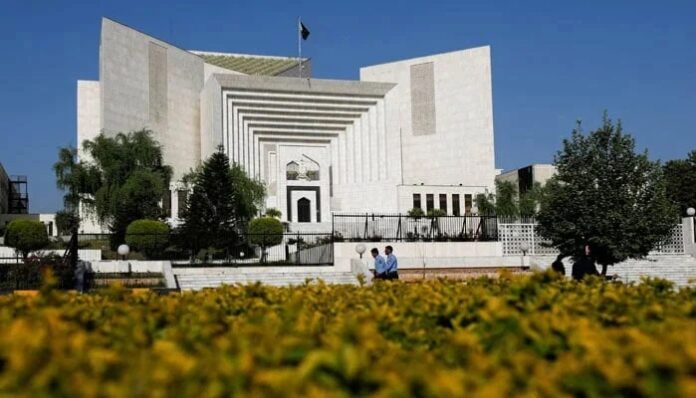The Supreme Court of Pakistan on Thursday rejected a plea seeking the live broadcast of the hearing in the National Accountability Bureau (NAB) Ordinance 1999 amendment case, which PTI founder Imran Khan attended via video link, according to Pakistan Talk Show.
A five-member bench, headed by Chief Justice of Pakistan Qazi Faez Isa and including Justices Athar Minallah, Aminuddin Khan, Jamal Khan Mandokhail, and Hasan Azhar Rizvi, resumed the hearing.
During the proceedings, Justice Minallah remarked that the hearing should be broadcast live as it was previously. However, Chief Justice Isa stated that the case was “technical” and not of public interest, concluding that there would be no live broadcast. After a break for consultation, the court rejected the live broadcast plea by a majority of 4-1.
Earlier in the hearing, Chief Justice Isa noted the absence of Khawaja Haris, the counsel in the original case, and expressed a desire to hear his stance. Haris clarified he did not require a fee for his services. The federal government’s lawyer, Makhdoom Ali Khan, explained that the case was prolonged due to questions of admissibility.
The case also touched upon the delay in general elections, with Chief Justice Isa jokingly noting that they resolved the election matter within 12 days after Justice Minallah joined him.
The federal government had filed a review plea in the NAB amendments case, asserting that the amendments did not violate basic rights and emphasizing that legislation is the right of Parliament. In a majority 2-1 verdict, the Supreme Court approved Imran Khan’s petition challenging the amendments made during the tenure of the previous Pakistan Democratic Movement (PDM)-led government, thus restoring graft cases against public office holders that were previously closed.
The NAB amendments case has been a point of significant contention, involving changes to the accountability laws that many argued either strengthened or weakened anti-corruption efforts, depending on the perspective. The rejection of the live broadcast plea reflects the court’s view on maintaining a more controlled and traditional approach to handling sensitive legal proceedings.
